World Energy Transitions Outlook 2022:

The International Renewable Energy Agency (IRENA) launched the World Energy Transitions Outlook 2022 at the Berlin Energy Transition Dialogue.
- The Berlin Energy Transition Dialogue (BETD) has become a leading international forum for key stakeholders of the energy sector.
- Energy transition refers to the global energy sector’s shift from fossil-based systems of energy production and consumption — including oil, natural gas and coal — to renewable energy sources like wind and solar, as well as lithium-ion batteries.
- The Outlook sets out priority areas and actions based on available technologies that must be realised by 2030 to achieve net zero emissions by mid-century.
- It also takes stock of progress across all energy uses to date, which shows that the current pace and scale of the renewables-based transition is inadequate.
- It provides in-depth analysis of two areas particularly relevant for the decarbonisation of end-use sectors: electrification and bioenergy.
- It also explores the socio-economic impacts of the 1.5°C pathway (under Paris Agreement) and suggests ways to speed progress towards universal access to clean energy (renewable energy).
Findings of the Outlook:
- Global annual additions of renewable power will triple by 2030 as recommended by the Intergovernmental Panel on Climate Change.
- At the same time, coal power will have to resolutely be replaced, fossil fuel assets phased out and infrastructure upgraded.
- The Outlook sees electrification and efficiency as key drivers of the energy transition, enabled by renewables, hydrogen, and sustainable biomass.
- End-use decarbonisation will take centre-stage with many solutions available through electrification, green hydrogen, and the direct use of renewables.
- High fossil fuel prices, energy security concerns and the urgency of climate change underscore the pressing need to move faster to a clean energy system.




